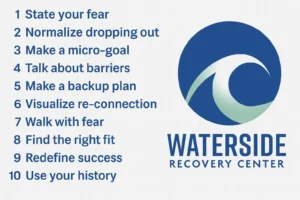You walked away.
Maybe it was a scheduling conflict, a job you couldn’t miss, a life event that pulled you out of the room. Or maybe it just felt like you couldn’t keep up anymore and you quietly slipped away.
Now the thought of returning to treatment — the one you left behind — feels heavier than the first time you walked in.
But it doesn’t have to keep you stuck. The doors of meaningful drug addiction treatment are still open. At Waterside Recovery in Plymouth County, MA, you can come back. And you can step forward.
1. Name the fear—so it loses half its power
Fear shows up in many forms:
- “What if they judge me for leaving?”
- “What if I try again and still fail?”
- “What if treatment means losing my job or my routines?”
These worries aren’t rare—they’re very normal. One recovery‑center article lists fear of sobriety, fear of boredom, fear of relapse among the most common blockers.
Write down your fear. Be honest. “I’m scared they’ll ask me what happened.” “I fear I’m just wasting time.”
When you see your fear in words, you begin to separate from it. It becomes something you have, not something you are.
2. Remind yourself: dropping out doesn’t disqualify you
If you left a program before, it’s easy to believe the door is shut. You might think: “They won’t take me back,” or “I’ll be penalized for quitting once.”
The truth? Many treatment programs expect returners. People cycle in and out. It doesn’t mean you failed—it means you’re human.
At Waterside you’ll find:
- A welcome instead of a condemnation.
- A focus on now—not only “what you missed.”
- A new plan built for your stage, not the newbie plan.
You’re not erased from recovery because you walked away. You’re simply returning to continue it.
3. Set a small “entry” goal instead of going all‑in
The idea of full re‑engagement can feel overwhelming. So don’t aim for perfection; aim for presence.
Example entry goals:
- “Call the admissions line and just ask a question.”
- “Visit the facility and take a guided tour.”
- “Meet with a counselor to talk about what happened last time.”
Create a micro‑step: one call, one visit, one conversation. That’s all you need today.
When the first step is manageable, it makes the next step possible.
4. List what didn’t work last time—and plan differently this time
You might already know some of the reasons you left:
- “The schedule conflicted with work.”
- “I didn’t feel seen in group.”
- “They pushed me too fast.”
Bring those to the table. Share them with the team.
When you return to drug addiction treatment, you deserve a plan built around you. Not a generic program.
At Waterside you can say: “Last time I quit because of X. What can we change so I stay this time?”
This is about learning—not blaming. Learning how this round can be different.
5. Prepare your “what‑if” safety net
Fear thrives in the unknown. To calm that, build a contingency plan:
- What if I feel overwhelmed on day one? → I’ll step out, call my support person, then return tomorrow.
- What if my work schedule hits? → I’ll ask about flexible hours or night options.
- What if finances scare me? → I’ll ask for sliding scale options or payment aid.
Having a fallback gives courage. You’re not trapped. You’re supported.
6. Visualize returning as reclaiming—rather than failing
Picture yourself walking back in. You see the team, you feel the nervousness.
But now you also feel something different: purpose.
You’re not returning because you didn’t succeed. You’re returning because you value your life—and you want something bigger than just being sober.
That metaphor matters: It’s not a “restart.” It’s a re‑connection.
You’re reconnecting with the life you paused. The person you were becoming. The hope that didn’t die—it just got sidelined.
7. Accept that fear may follow you—but you don’t let it lead
You won’t magically lift fear off your shoulders. But you can learn to act through it.
Recognize the old self‑talk:
- “What if I fail again?”
- “What if they think I’m just wasting time?”
Respond with new truths: - “Trying again shows I care about this life.”
- “This time I’m doing it on my terms, with what I learned.”
When you act through fear instead of letting it freeze you—you build real strength.
8. Choose your “who”—before you pick your “program”
The quality of your drug addiction treatment experience will depend on the people you bring into your world.
Ask:
- Do I feel seen when I talk with the staff?
- Can they meet me where I am, not just where they expect me to be?
- Are there others in the program who’ve stepped out before and come back—and aren’t judged?
Whether you live in Plymouth County or are looking for drug addiction treatment in Bristol County, MA, you deserve a community that welcomes returners with open arms—not a scoreboard.
9. Re‑define success for this round
Last time success meant: “Don’t use.”
This time it can mean:
- “Show up loud or quiet; I’ll be there.”
- “Ask for support when I need it.”
- “Finish one week.”
- “Tell the truth in group.”
Small wins add up. Including: coming back.
Those wins matter. Because recovery isn’t only avoiding what you don’t want—it’s building what you do want.
10. Know you’re stronger for your history—if you let it teach, not shame
The past isn’t a brand you wear. It’s an experience you use.
You walked away once. That means you’ve learned about your barriers. Your patterns. What broke you.
When you come back knowing that—that’s powerful.
Use your history as a map. Not a scar.
And let the treatment team help you chart a route forward—based on the person you are now, not just the one you were.
FAQ: Returning to Drug Addiction Treatment After Dropping Out
Q. Will people judge me for leaving before?
A. No. Good programs understand that drop‑outs happen. The focus is on what you want now. Judgment doesn’t belong.
Q. Do I have to start from the beginning again?
A. Not necessarily. Your previous progress counts. The team can build from where you are now—with respect for what you learned.
Q. What if I don’t think I’m “bad enough” to be in treatment?
A. Needing help doesn’t depend on crisis. If you’re stuck, disconnected, or tired of coping alone—those are valid reasons to seek treatment.
Q. What if I’m afraid I’ll relapse during treatment?
A. Valid fear. But programs will plan for it. Treatment is not only avoidance—it’s skill‑building, connection, and structure.
Q. Can I access this in my region?
A. Yes. Whether you’re in Plymouth County or looking for drug addiction treatment in Kingston, MA, Waterside’s services are designed with accessibility, understanding, and returners in mind.
You don’t have to prove your readiness. You just have to prove your willingness.
Call (866) 671‑8620 to learn more about our drug addiction treatment services in Plymouth County, MA.



